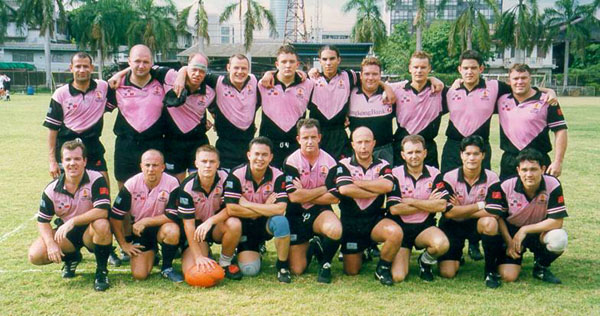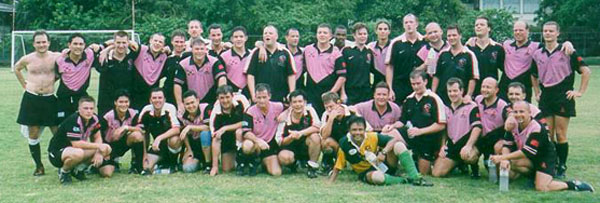
by

Yes, yes, you want to know - how
did rugby get started in Thailand? Well, you see it happened at the beginning of
the century when rich Thais started going to British public schools. They
learned the game there and then brought it back to Thailand.
"Two schools in particular
took the lead, Vajeeravudh and King's College," says Dominic Whiting, the
captain of the British Club rugby team. "They were set up for rich Thais
and modeled after British public schools, and they had large grounds with rugby
pitches."
It seems funny that a sport like
rugby, which is very tough and can be very vicious was a bastion for the rich
occupying a status most oft-associated with games such as polo, cricket or even
fox-hunting. You see, for years, the game in England, was only played in public
schools (what North Americans refer to as private schools) while the rabble
played football.
So until recently, rugby in
Thailand was played exclusively by these two schools and Thammasat and
Chulalongkorn Universities, which is where the prep-school grads ended up going
for their further education.
Then in the late 70s and the
early 80s the forces started to play the game. Rugby was then given a big boost
by the former head of the armed forces, General Wimol Pongpanich, who saw it as
a way to toughen up his troops. The game then started to get some more TV
exposure, especially with the advent of the Rugby World Cup, and more
universities and schools throughout the country started to play.
The game normally has fifteen men on a side, but the Bangkok squads tend to play 10 aside (10s) or seven aside (7s), and each half is seven-and-a-half minutes long, running time. In a regular game, the halves are forty minutes long. The game has recently introduced a "sin bin" whereby fighting or a particular vicious high tackle are penalized with ten penalty penalties, where the opposing side has to play a man short.

PRE GAME
Thais aren't very big, but they
are very fast so they make good 7s and 10s players, but they are not as adept in
games of 15 aside when teams need to rely more on their bigger forwards. Dominic
also points out that the Thais are very clean players, so the games rarely get
out of hand. "Rugby gets ugly because of old dodgers who can't make it
anymore," says Dominic.
In a recent 7s tournament in
Bangkok, the under 19s competition was won by a team from Surin when they beat
the team from Vajeeravudh ("a real cat among the pigeons," says
Dominic). So as you can see, rugby has really started to take off around the
country.
Every Thursday the practice
handling skills and has a bit of a run around at 7PM on the British Club's
tennis courts. The team also has full contact practices for part of the season
on the Aero Field at Chongnonsee on Thursday nites at 7:30.
"We try and attract as many
young Thai players as possible, Dominic says, "Remember, once you leave
university, unless you are on one of the Forces' teams, there aren't many places
to play the game here, so many stop playing the game when they turn
twenty-two."
The team has traveled to
tourneys in the Philippines, Hong Kong, Vietnam, Laos, Singapore, Bali and even
Sri Lanka, where it was a last minute substitute for the Thai national team in
an international competition featuring Asia's best teams.

POST GAME
The Club has a number of
generous sponsors including the Oakwood Residence and Riley's Pub. It has a
sponsorship policy, which allows some of the Thais who cannot normally afford to
travel, to join the team on some of these excursions. It also sponsors a girls'
team in Suphanburi, whereby it buys their kit and rugby balls.
The main Thailand League has two
divisions. The first includes the Royal Bangkok Sports Club (a Thai team), all
the Forces' teams (Army, Air Force, Navy & Police), and two farang teams.
This year, the three farang
squads - the Corsaires, the British Club and the Southerners - joined forces to
form two teams in the first division of the league. This is no mean feat when
you consider the British Club and Corsaires used to be bitter rivals. The two
squads train together and while Dominic is the captain of the second squad,
Simon Park, the Southerners' captain, skips the first side.
The second division is made up
of a number of teams including a Japanese squad, the Army Cadets, and
Chulalongkorn and Thammasat Universities.
The last time the British Club
was champion of the Thai League was back in 1992, although it made to the finals
in 1993 and 1994.
The Police tend to have the best
team as they can give players jobs if they are good, and these players tend to
stick around for awhile, while those on the forces' teams may not be able to
hang around for very long.
The season runs from July to
September to coincide with the rainy season, so that the ground will be softer.
The teams play games about once every two weeks, but the British Club
also plays a number of exhibition games against touring teams during the
year. The games are played at Chulalongkorn University and at a number of
international schools throughout Bangkok.
You don't have to be a member of
the British Club to join the team. "We take anyone in," says Dominic,
"especially for our touch rugby sessions, because you can play that without
having played all your life. And if newcomers play touch rugby every week for
about a year, they will become good players. But it's not an easy sport to pick
up.
"Rugby is a great
sport," he says, "because anyone can play regardless of their size and
speed. So if you are tall and thin you can play on the wing, or if you are short
and fat you can play in the scrum and at forward. Absolutely anyone can find a
position."
The club has distinctive pink
and black shirts. Jeremy Guscott, a former British national and one of England's
best, recognized the shirt a few years back and approached Dominic while he was competing
in Hong Kong, to ask him about a friend of his who had moved to Bangkok.
Has the British Club itself ever had famous current or ex-players? Well, Marcus Carling, the brother of Will Carling, the ex-English captain, played with the British Club back in 1992.
What's Dominic most proud of when it comes to rugby in Thailand? "We really try and promote Thai rugby, especially with players who might not be able to play otherwise. We have a good spirit going, we are not too serious and everyone gets along very well. We go on good tours. We have a lot of social events too as we will book the British Club to watch an international game or we will all go out together to celebrate some event. I think our club spirit is better than any other club's in Thailand. Having a clubhouse in the British Club also helps us tremendously."
More rugby history from rugby aficionado Michael Streeter:
“The 1895 split, when 22 rugby
clubs in the north of England formed a breakaway Northern Union (now rugby league), was caused
in part by intransigent attitudes of the English middle and upper classes. But it is important to note the
role of the Scottish in this breakaway - the Scots loathed professionalism even more than the English
ruling classes. Only in the Scottish Borders was it other than an overwhelmingly middle-class sport in
Scotland.
“Rugby was also always a working class game in Cornwall (miners) Devon (farmers and
fishermen) Gloucestershire (farmers and miners) - to name but a few areas. In Ireland, the game was
overwhelmingly middle class apart from in Munster - the Gaelic football authorities have always
regarded football, rugby and cricket as tools of British imperialism. In Wales, the game always was
and still is a working class sport, though in truth it has always embraced all strata of Welsh society.”
Contact Info:
Tel: (662) 655-0671
E-mail: jaydom@loxinfo.co.th
Website: www.britclub.com
FINIS